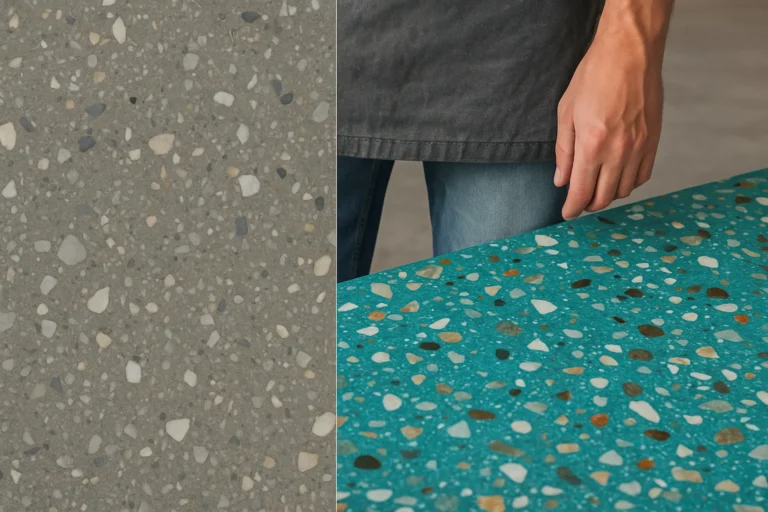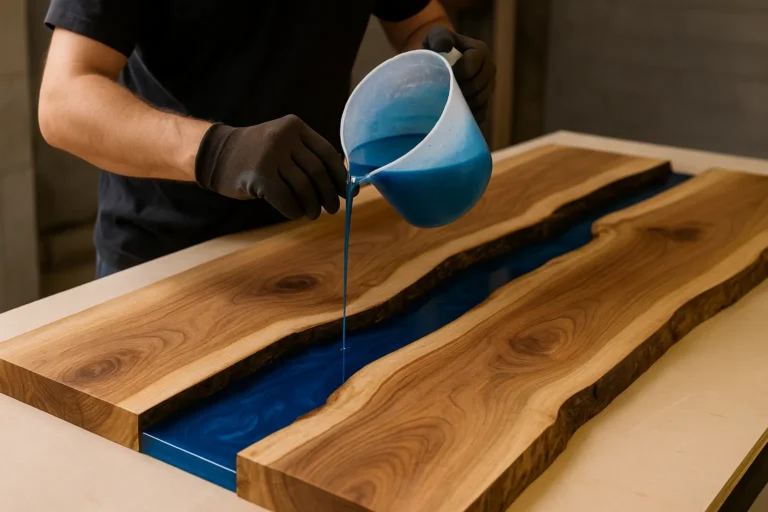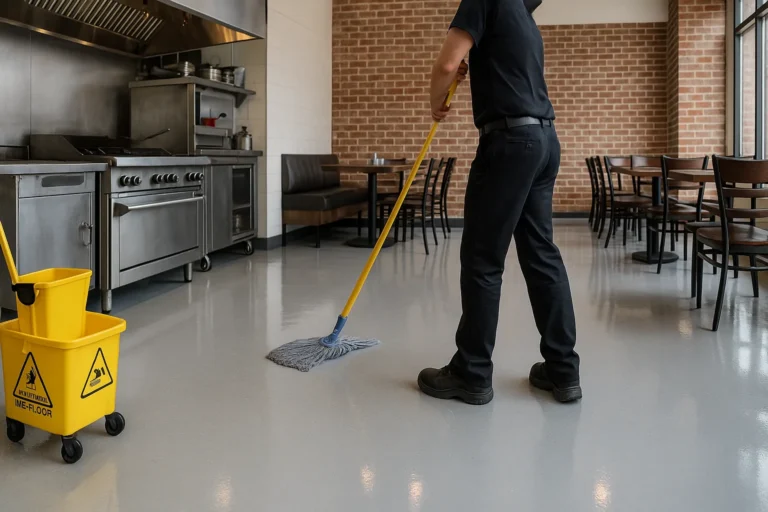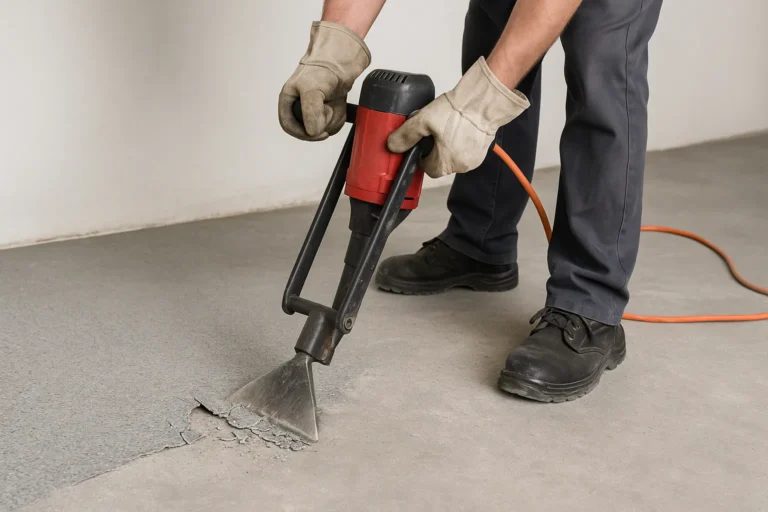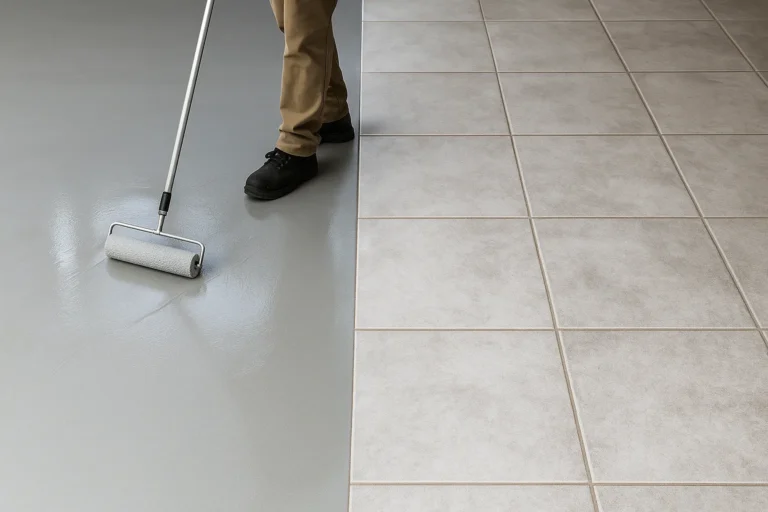What Is Acid Etching for Concrete in UAE?
Acid etching is a popular method for preparing concrete surfaces in the UAE, offering a unique approach to surface bonding and textured finishes. This technique involves applying acid solutions to concrete to create a rough texture, enhancing the adhesion of coatings and overlays. The process is particularly favored in the UAE due to its effectiveness in dealing with the region’s specific environmental conditions.
Benefits of Acid Etching for Concrete Surfaces
Acid etching provides several advantages for concrete surfaces. It increases the surface area, which significantly improves the adhesion of paints and sealants. This method is also cost-effective and relatively easy to apply, making it accessible for both residential and commercial projects.
- Enhances adhesion for coatings
- Cost-effective surface preparation
- Suitable for various concrete applications
Common Acids Used in Concrete Etching
The most commonly used acids for etching concrete include hydrochloric acid and phosphoric acid. These acids effectively remove the top layer of the concrete, exposing a fresh surface that is ideal for bonding.
- Hydrochloric acid
- Phosphoric acid
- Sulfuric acid
Safety Precautions for Acid Etching
Safety is paramount when performing acid etching. Proper protective gear, such as gloves and goggles, is essential to prevent skin and eye contact with the acids. Additionally, ensuring adequate ventilation is crucial to avoid inhaling harmful fumes.
- Wear protective gear
- Ensure proper ventilation
- Follow safety guidelines
Surface Bonding Techniques for Concrete
Surface bonding is critical for ensuring the longevity and durability of concrete structures. Various techniques can be employed to achieve optimal bonding.
Mechanical Bonding Methods
Mechanical bonding involves creating a physical interlock between the concrete surface and the overlay. This can be achieved through methods like sandblasting or grinding, which roughen the surface to enhance adhesion.
- Sandblasting
- Grinding
- Shot blasting
Chemical Bonding Agents
Chemical bonding agents, such as epoxy and latex, are used to create a strong bond between the concrete and the overlay. These agents penetrate the concrete surface, providing a durable and long-lasting bond.
- Epoxy resins
- Latex bonding agents
- Silane-based primers
Importance of Proper Surface Preparation
Proper surface preparation is crucial for successful bonding. According to the American Concrete Institute, it can increase concrete-to-concrete bond strength by up to 50%. This involves cleaning the surface thoroughly and ensuring it is free from contaminants.
- Clean surface thoroughly
- Remove contaminants
- Ensure surface is dry
Creating Textured Finishes with Acid Etching

Acid etching is not only used for surface preparation but also for creating aesthetically pleasing textured finishes.
Popular Texture Patterns Achievable Through Etching
Various texture patterns can be achieved through acid etching, including swirls, waves, and geometric designs. These patterns add visual interest and can be customized to suit specific design preferences.
- Swirls
- Waves
- Geometric designs
Combining Acid Etching with Other Finishing Techniques
Combining acid etching with other finishing techniques, such as staining or sealing, can enhance the appearance and durability of the concrete surface. This combination allows for a wide range of design possibilities.
- Staining
- Sealing
- Polishing
Durability of Acid-Etched Textures
Acid-etched textures are known for their durability. The process not only enhances the surface’s appearance but also increases its resistance to wear and tear, making it suitable for high-traffic areas.
- Resistant to wear
- Suitable for high-traffic areas
- Long-lasting finish
Adhesion Techniques for Concrete Surfaces
Adhesion techniques are essential for ensuring that coatings and overlays remain firmly attached to concrete surfaces.
Mechanical Adhesion Methods
Mechanical adhesion methods involve creating a rough surface that allows coatings to grip effectively. Techniques like grinding and shot blasting are commonly used to achieve this.
- Grinding
- Shot blasting
- Scarifying
Chemical Adhesion Solutions
Chemical adhesion solutions, such as primers and bonding agents, are applied to the concrete surface to enhance the bond between the substrate and the overlay. These solutions penetrate the surface, providing a strong and durable bond.
- Primers
- Bonding agents
- Adhesive coatings
Factors Affecting Adhesion Strength
Several factors can affect the strength of adhesion, including the condition of the concrete surface, the type of bonding agent used, and environmental conditions. Ensuring the surface is clean and dry is crucial for optimal adhesion.
- Surface condition
- Type of bonding agent
- Environmental conditions
Environmental Considerations in Acid Etching
Environmental considerations are increasingly important in the UAE, where sustainable practices are encouraged.
Eco-Friendly Acid Alternatives
Eco-friendly acid alternatives, such as citric acid and vinegar, are gaining popularity as they are less harmful to the environment. These alternatives provide similar etching results without the negative environmental impact.
- Citric acid
- Vinegar
- Biodegradable acids
Proper Disposal of Etching Waste
Proper disposal of etching waste is crucial to prevent environmental contamination. Waste should be neutralized and disposed of according to local regulations to minimize its impact on the environment.
- Neutralize waste
- Follow local regulations
- Prevent contamination
Compliance with UAE Environmental Regulations
Compliance with UAE environmental regulations is essential for any acid etching project. These regulations ensure that the process is conducted safely and sustainably, protecting both the environment and public health.
- Adhere to regulations
- Ensure safe practices
- Protect public health
Applications of Acid Etched Concrete in UAE

Acid etched concrete is versatile and can be used in various applications across the UAE.
Residential Uses
In residential settings, acid etched concrete is often used for driveways, patios, and walkways. Its decorative appeal and durability make it a popular choice for homeowners looking to enhance their outdoor spaces.
- Driveways
- Patios
- Walkways
Commercial and Industrial Applications
Commercial and industrial applications of acid etched concrete include flooring for warehouses, factories, and retail spaces. The enhanced adhesion and durability make it suitable for high-traffic areas.
- Warehouse flooring
- Factory floors
- Retail spaces
Decorative Concrete Projects
Decorative concrete projects benefit from acid etching due to its ability to create intricate patterns and textures. This makes it ideal for artistic installations and custom designs.
- Artistic installations
- Custom designs
- Decorative flooring
Comparing Acid Etching to Other Surface Preparation Methods
When preparing concrete surfaces, it’s essential to compare different methods to determine the best approach.
Sandblasting vs. Acid Etching
Sandblasting and acid etching are both effective surface preparation methods. Sandblasting uses abrasive materials to remove surface layers, while acid etching uses chemical reactions. Each method has its advantages and is suitable for different applications.
- Sandblasting: Abrasive removal
- Acid etching: Chemical reaction
- Suitable for different applications
Grinding vs. Acid Etching
Grinding involves mechanically removing the top layer of concrete, while acid etching uses acids to achieve a similar effect. Grinding is often preferred for larger areas, while acid etching is ideal for detailed work.
- Grinding: Mechanical removal
- Acid etching: Chemical process
- Ideal for different project sizes
Cost-Effectiveness of Different Methods
The cost-effectiveness of surface preparation methods depends on the project’s size and requirements. Acid etching is generally more affordable for smaller projects, while grinding may be more cost-effective for larger areas.
- Acid etching: Affordable for small projects
- Grinding: Cost-effective for large areas
- Consider project size and requirements
Maintenance of Acid Etched Concrete Surfaces
Proper maintenance is essential to preserve the appearance and functionality of acid etched concrete surfaces.
Cleaning and Care Tips
Regular cleaning is crucial to maintain the appearance of acid etched concrete. Using mild detergents and avoiding harsh chemicals can prevent damage to the surface.
- Use mild detergents
- Avoid harsh chemicals
- Regular cleaning
Resealing Acid Etched Surfaces
Resealing acid etched surfaces helps protect them from wear and environmental damage. It’s recommended to reseal every few years, depending on the level of use and exposure.
- Protects from wear
- Recommended every few years
- Depends on use and exposure
Addressing Common Issues and Repairs
Common issues with acid etched concrete include staining and surface wear. Addressing these issues promptly can prevent further damage and extend the surface’s lifespan.
- Staining
- Surface wear
- Prompt repairs
Advanced Techniques in Concrete Surface Bonding
Advancements in technology have led to innovative techniques in concrete surface bonding.
Nanotechnology in Concrete Adhesion
Nanotechnology is being used to enhance concrete adhesion by creating stronger bonds at the molecular level. This technology improves the durability and longevity of concrete surfaces.
- Stronger molecular bonds
- Improved durability
- Enhanced longevity
Polymer-Modified Bonding Agents
Polymer-modified bonding agents offer superior adhesion and flexibility. These agents are particularly useful in applications where traditional bonding methods may fail.
- Superior adhesion
- Increased flexibility
- Suitable for challenging applications
Innovative Surface Preparation Methods
Innovative surface preparation methods, such as laser etching and ultrasonic cleaning, are emerging as effective alternatives to traditional techniques. These methods offer precision and efficiency in preparing concrete surfaces.
- Laser etching
- Ultrasonic cleaning
- Precision and efficiency
Achieving Optimal Results with Acid Etching
Achieving optimal results with acid etching requires attention to detail and adherence to best practices.
Factors Affecting Etching Quality
Several factors can affect the quality of acid etching, including the concentration of the acid, the application method, and the condition of the concrete surface. Ensuring these factors are carefully controlled is essential for achieving the desired results.
- Acid concentration
- Application method
- Surface condition
Best Practices for Consistent Results
Following best practices, such as using the right acid concentration and ensuring even application, can help achieve consistent results with acid etching. Proper surface preparation and safety measures are also crucial.
- Right acid concentration
- Even application
- Proper preparation
Troubleshooting Common Etching Problems
Common etching problems, such as uneven textures or insufficient adhesion, can be addressed by adjusting the acid concentration or application technique. Identifying and resolving these issues promptly is key to successful etching.
- Uneven textures
- Insufficient adhesion
- Adjust concentration or technique
The Future of Concrete Surface Treatment in UAE
The future of concrete surface treatment in the UAE is promising, with emerging technologies and trends shaping the industry.
Emerging Technologies in Surface Bonding
Emerging technologies, such as self-healing concrete and advanced bonding agents, are revolutionizing surface bonding. These innovations offer improved performance and sustainability.
- Self-healing concrete
- Advanced bonding agents
- Improved performance
Trends in Decorative Concrete Finishes
Trends in decorative concrete finishes include the use of vibrant colors, intricate patterns, and sustainable materials. These trends reflect a growing demand for aesthetically pleasing and environmentally friendly solutions.
- Vibrant colors
- Intricate patterns
- Sustainable materials
Sustainable Practices in Concrete Treatment
Sustainable practices, such as using eco-friendly materials and reducing waste, are becoming increasingly important in concrete treatment. These practices align with the UAE’s commitment to environmental sustainability.
- Eco-friendly materials
- Waste reduction
- Environmental sustainability
FAQs
What is the purpose of acid etching concrete?
The primary purpose of acid etching concrete is to prepare the surface for coatings and overlays by increasing its roughness. This process enhances the adhesion of paints, sealants, and other finishes, ensuring they remain firmly attached. Additionally, acid etching can be used to create decorative textures on concrete surfaces.
How long does acid etched concrete last?
Acid etched concrete can last for many years if properly maintained. The durability of the etched surface depends on factors such as the quality of the etching process and the type of finish applied. Regular maintenance, including cleaning and resealing, can extend the lifespan of acid etched concrete.
Is acid etching better than grinding concrete?
Acid etching and grinding each have their advantages, and the choice depends on the specific project requirements. Acid etching is ideal for creating detailed textures and enhancing adhesion, while grinding is better suited for leveling surfaces and removing significant imperfections. Both methods can be effective when used appropriately.

